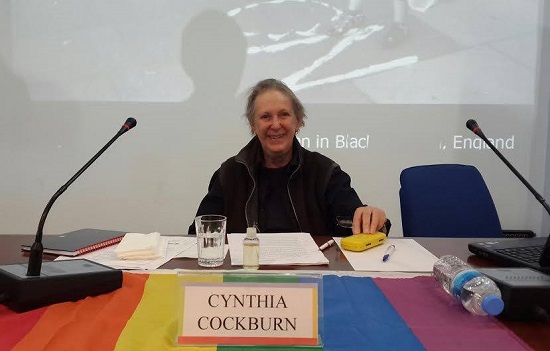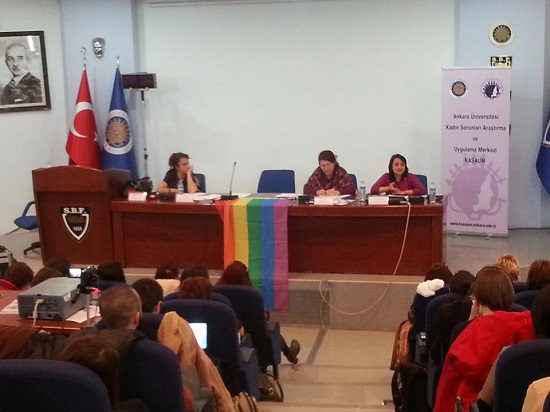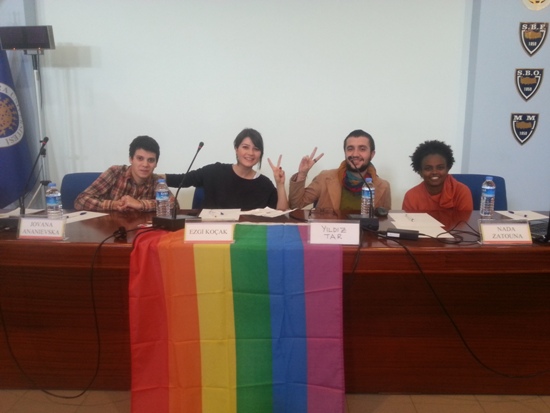18/03/2014 | Writer: Nora Leggemann
The main focus of the Feminist Forum 2014 was the participation of women in peace and peace-making processes, as well as the possibilities of feminist and LGBT movements to work together.

The 3rd International Feminist Forum was held in Ankara by Kaos GL Association, Women’s Problems Research and Implementation Centre (KASAUM) and Ankara University Department of Women’s Studies from 14th to 16th March 2014. The main focus of the Feminist Forum 2014 was the participation of women in peace and peace-making processes, as well as the possibilities of feminist and LGBT movements to work together.
Feminists and LGBT activists from different countries such as Canada, Egypt, Georgia, India, Macedonia, North Cyprus, Turkey and the UK participated in the forum. While the workshop “Feminist strategies for peace” with Cynthia Cockburn on the 14th of March was a closed event with a limited number of participants, the meetings on March 15th and 16th were open to everybody and gave space to several interesting and inspiring speeches and lively discussions.
On March 15th, three different sessions were held in the Aziz Köklü Conference Hall at the Cebeci Campus of Ankara University:
10.00-12.00
In the opening speech, which was titled The Gender of War: Feminist Strategies for Peace, the feminist peace activist, researcher and writer Cynthia Cockburn talked about her thesis saying that patriarchy and gender hierarchy is not only an effect of war, but it is, together with economic and ethno-nationalist dimensions of power, a main cause for militarization and war. It must be analyzed and understood how ideas of manhood and masculinity (e.g. honor, strength, power, victory) promote militarization and war. But this is often not the case, for there is still very little willingness to see patriarchy and gender hierarchies as a cause of war and therefore to see the importance to analyze and to fight it. According to Cockburn, the requirements for a successful and lasting peace process are the following:

-Patriarchy and gender hierarchies have to be seen and analyzed as causes of militarization and war.
-Patriarchy and gender hierarchies have to be targeted and changed towards justice and gender equality.
-Patriarchy and gender have to be seen in their intersections with other systems of power.
-Women have to actively participate in any peace-making process.
-Not only women, but also men have to stand up against patriarchal gender hierarchies in order to effectively change them.
13:00-15:30
In the session Feminism and Anti-militarism: Women’s Peace Movements, Alev Özkazanç from the Ankara University and the feminist Kurdish activist and writer Handan Çağlayan discussed the experiences of women with peace and peace-making processes and the extent to which women have been participating in these processes in Turkey so far. Unfortunately, Nazan Üstündağ could not attend the forum as scheduled due to health problems.
Alev Özkazanç presented the topics and results from the workshop “Feminist strategies for peace” with Cynthia Cockburn from the previous day. “The concept of peace must be thought together with patriarchy,” said Özkazanç, also pointing at the racist attacks on Peoples’ Democratic Party (HDP) and Peace and Democracy Party (BDP).

Handan Çağlayan underlined the connection between militarism and patriarchy with questions as follows: “What kind of estimates can we make about the current lives of men who did their military service in [the southeastern provinces of] Hakkari, Şırnak, Bingöl and Lice? Where did those men who murdered women with guns and knives in our country where at least 3 women were murdered on the daily basis.
16:00-17:30
In this session, titled Regional Cooperations in the LGBT and Feminist Resistance Practices,three different activists from Macedonia, Egypt and Turkey, spoke about the situations, relations and collaborations of and between feminist and LGBTIQ movements in their home countries.
Jovana Ananievska from the LGBTI Support Center in Macedonia told us that lately more and more inspiring movements have emerged in Macedonia, combining both feminist and lesbian concerns. This is especially an important step since the older women’s movements usually did not include LGBTIQ issues in their agendas – and sometimes did not even call themselves feminist –, while the gay and lesbian movement was usually very much dominated by gay men. At the same time, a growing conservative and nationalist trend and movement in Macedonia is trying to reduce women’s and LGBTIQ people’s rights. Ananievska also spoke about the difficulty to build a strong and united feminist movement because of the existence of many ethnical groups and boundaries in Macedonia, since the first point of identification for most groups and organizations is their ethnical background and not so much the shared feminist ideas.

Nada Zatouna from Egypt described her organization as a feminist group of both women and men which believe that the issues of feminism and gender are important for society and therefore they try to mainstream these topics through documentation, analysis and advocacy and through the arts, as well as through an annually held pilot project called the feminist school. They also try to fight the extensive violence against women in Egypt and provide legal and psychological support for the survivors of (sexual) violence.
Her organization holds the opinion that feminist and LGBTIQ issues cannot be separated from each other and therefore tries to collaborate with LGBTIQ organizations and also to address LGBTIQ issues in their projects, e.g. in their feminist schools. This is not easy since most people in Egypt deny the existence of LGBTIQ individuals. In this sense, as Zatouna put it, “my organization does not have the privilege of being public, because it is too dangerous. All the work is underground and private.”
Yıldız Tar, a member of the Kaos GL association from Turkey, started his speech by mentioning the disputes between feminist and LGBTIQ organizations in Istanbul on the 8th of March, fighting over the question who had the right to participate in what way. This is, according to Tar, a sad example of how little feminist and LGBTIQ organizations often work together, although they are actually fighting against the same system and state. But patriarchy cannot be questioned without questioning heteronormativity at the same time and therefore feminist and LGBTIQ movements have to work together. Tar also mentioned the Gezi protests as a good example of how different groups can come together, fight together and learn from each other.
This very interesting and intense day was completed with a little get-together over good music, nice conversations and some drinks in the Roxanne Bar in Kızılay.
Kaos GL’s 3rd International Feminist Forum was supported by SIDA, the Norwegian Embassy, Urgent Action Fund for Women’s Human Rights, Frontline Defenders, Mediterranean Women’s Fund and Ankara University KASAUM.
Tags: women

